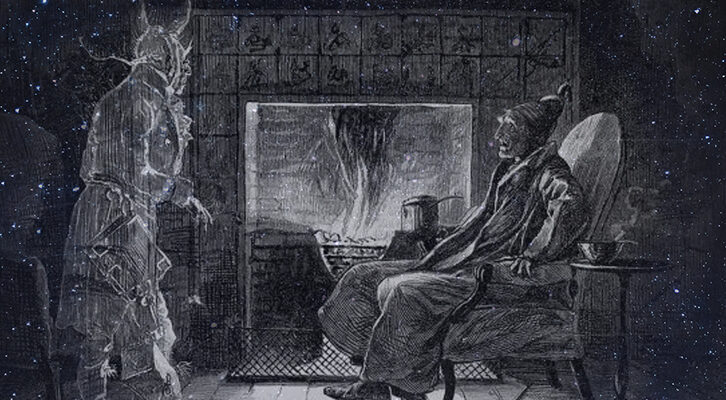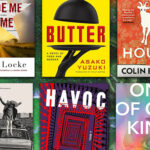Birthing Calfs, Writing Novels: This is My Job Now
John Connell on Passing Life's Tests, Big and Small
I’m 29 and I’ve never delivered a calf myself. But that’s all about to change because I’ve got my arms in and I’m trying to find the new calf’s feet.
As a farmer’s son, I’ve birthed calves aplenty, but always as the helper, holding a cow’s tail up or pulling the calf out at the last moment. My father has been in charge of the calving for 25 years, and when he wasn’t, my brother took over, but now that I’m home, it’s me.
I’m home again in rural Ireland, back from being an emigrant, here to write a novel, to try and make it as a writer, and, in exchange for a roof over my head, it’s been agreed that I will help out on the farm. There’s a lot tied up in this birth for me, much more than the cow knows.
The red cow moves suddenly and lets me know her strength and power. I must be quick. I must get the ropes around the calf’s feet, slide them above the hock and pull them tight. The amniotic fluid wets my hands, my arms, and I remember now the talk I have heard other men say, that your hand gets weak after a time, that the clasp of her vaginal embrace takes the power from it. I must be quick lest the calf die.
I think for a moment that I am glad I am alone and doing this myself. I could call for help. I could, but then I would still not be tested, would still not be able to prove that I can do this myself. I will call no one. I grasp the first foot and slip the rope over his hock.
I had been watching the red cow all night and could sense that she was going to calve. She was sick, as Mam calls it, patrolling her pen, not eating her silage or nuts or water, and then I saw that her passage was broken down, sausage-like.
Da—my father, Tom—is away. He is at the sheep mart with his brother Davy. As older men, they have found each other again as friends. They go to the sheep sales together every week. Sheep are a new thing for us—we have only been keeping them three years. We have a flock now, as does Davy. He and Da buy and sell the animals for fun; it gives them a hobby and something to do together, and above all it makes my father happy, for he is a sociable man. I never begrudge him these trips, for I know they do him good and give him a break from the farm. I know too that he won’t be in the mood to fight after them. That is the most important thing, for we are trying, this calving season, not to fight, and so far it is working. I cannot say that we are friends yet, but a respect has come between us that was never there before. It is a small and delicate thing, still fragile.
I have the other foot. I take the second rope from the side of the gate and slide it onto the calf’s leg. It slips and falls and I curse, and now I think perhaps I do need help, but it is too late. To wait might mean death and then I would be called a fool for trying on my own and there would be a huge row. No, I must focus. The cow has nearly finished the nuts, which are a meal ration I gave her to keep her calm. When they are gone, she will remember her distress and begin to thrash and kick again, and then the job will be all the harder.
I stoop low, take the rope and turn to my work again. The rope is now on the second foot. I pull gently, but the calf is big: he will not come like this; I will need the jack. I take the mechanical wrench, placing it on the cow’s hips, and hook the ropes into the slots and begin to winch.
I must do this right, I tell myself, though I have seen it done so many times I know my actions. I must jack, then lever down to bring the calf out. The biggest pull will be his head, and once I have that out, the rest should follow, except the hips, which can sometimes be trouble. I winch the jack five times and hear the sprocket chime out in the quiet shed. I pull down, and as I do the cow bellows low in a noise I don’t recognize, a noise of pain and strangeness.
“There, there,” I say, clucking to her. I let off the pressure and jack once more and feel the sprockets turn and the ratchet move up the teeth. The legs emerge more fully now, but still no head, and so I lever down again. I can see his nose; it looks so flat, perhaps his head is squashed. The cow bellows low again and I feel her feet tremble.
“Don’t go down on me,” I say, and let the pressure off once more and she stands to again and we repeat our chores. Her contractions push the calf as much as they can, but he is beyond contractions now, for he is too big and our job is at a point where it cannot be undone.
I jack once more and the cow roars. I am sure Mam will waken now, for she is such a light sleeper. It was she I turned to for advice tonight to make sure I did not take the calf too soon. She has known cows all her life and is wiser than us all with them, but again I remind myself: this is my job now.
I pray, or at least I think I do. The head emerges and I have no time to thank God, for I must jack with all my might and keep going, for the cow could give way, and if she goes down, the calf might die. I see his tongue wag and I know he is alive and I pull still stronger, though my arm is growing tired. I jack and jack and he is emerging now, fluid and strong, and he is red like his mother, with a white sketch on his face. He is the son of our stock bull, of that I am sure, for I can see the old bull’s face in his.
The calf’s hips are big and the winch of the jack is at its end. The cow is in distress and I remember now Da’s words to twist the calf to bring the hips out, so I do, and I take him in both my arms and the adrenaline is such that I do not feel his weight. I carry him to the fresh bedding, jack, ropes and all. I must move quick still, for we have lost calves with fluid on their lungs before.
I pour water in his ears and he shakes his head and comes to moving life, and I smile with relief. But then he coughs and I can hear the fluid, so I take a breathing tube with a mask on its end and fit it over the calf’s muzzle. You extend the pump and its vacuum pulls the fluid up and, in theory, the calf should cough up the fluid. I do this three times, but the fluid does not come up and he begins to wheeze. I cannot lose him. I pick him up with a roar and carry him over to the gate and sling him across it.
I have seen this done before, but the calf has always been lifted by two men, so I know that I must have found new strength. I massage his lungs and give him a slap and soon I see the mucus emerge. He lifts his head and I know that he is won. I release him down into my arms and carry him back to the fresh bedding, alive and safe.
I disinfect his navel, take a small breather and walk to the farm kitchen. There is blood on my arms and face, but it is a pleasing blood, the blood of life. I rinse my hands in a barrel of water. The frost has come and the water is cold and it stings.
My job is not done, though, for I need to get the calf to feed. When a cow gives birth her milk is of a special kind that we call beestings. This colostrum is thick and yellow, and the calves must have it straightaway, for it keeps them alive and gives them the necessary antibodies to ward off infections and sickness. The first few hours in a calf’s life are its most important; if these things are not done—if he is not fed, his navel not treated—any number of things could kill him. Pneumonia is a plague to us farmers; it has killed so many calves. Scour too has taken its toll of death.
We always tube-feed our newborn calves. It means we know they get milk into them and you can rule out a whole lot of checking on them later in the night. The stomach tube is a plastic pipe connected to a bag. The pipe is inserted down the calf’s throat and the milk goes directly to his stomach. This is a dangerous job, for if the pipe is inserted incorrectly, it could go into a lung and kill him as soon as the milk starts flowing. First I must milk the cow. I wet my hands and take her tit between my fingers. I strug it and, after two or three pulls, the milk squirts out. I massage it now, as I have seen my father do, and find the natural rhythm and soon my jug is filling. The beestings is thick and warm like custard. The cow makes to kick, but I am too quick and rescue my jug.
“Easy, girl,” I say, and talk sweet nonsense to her. Her hard work is done and I shall not chastise her now.
The calf rustles in the straw and she turns and shouts to him, and he cries a small, plaintive cry, as much as to say, I am alive.
I steady myself again and move on to her next tit and strug and milk and soon the milk is squirting into my jug, singing in the age-old sound of milk pouring onto itself. It is a sound all farmers know. It is the sound of my childhood, and my parents’, and theirs before them. I think now that this family I am part of has been doing this for so long—so many sleepless late nights spent milking in sheds and barns and, who knows, before my grandfather’s time, perhaps on the cottage floor by the fire in the old house. The times have changed, but not the animals, and not our actions.
My jug is now overflowing, so I pour it into the stomach tube bag. I take another jug and by the time it is full I have broken the seal of all four tits and they will be easier for the calf to suck. This cow’s teats are not so big, which is a good thing, for I have seen cows with big, long, dangly ones that calves struggle to hold in their mouths, and that creates its own problems.
The stomach tube bag is full now, so I must begin to feed him. This too is a first for me and I must be careful. I sit lightly atop the calf’s back so he cannot struggle. Then I lift his head, pry open his mouth with one hand and insert the tube with the other.
“That’s it,” I say, and I do not know if I am talking to the calf or to myself, but together we are doing this and slowly now the pipe moves down his throat. I think I have avoided his lungs, so I lift the bag into the air and watch the colostrum drain away down the tube and inside him, and I know the end of the job is near.
“Thanks be to God,” I say, in the way that I have heard others speak, and I am glad of this automatic phrase, for it is the truest saying that I can find in this moment.
I release the calf and sit back, resting against the whitewashed wall of the calving house. And with that, the half door opens and it is my father, bright and smiling.
“She calved.”
“Just pulled him there.”
“You should have called your brother.”
“Can’t always be calling people,” I say.
“Sometimes you just have to do it yourself.”
“Sometimes you do,” he says, and smiles.
And I know now that something has happened. I’ve passed a test of some kind and I am glad. He opens the half door and walks in. He is in his jobbing coat, which is his blue velvety coat for the mart. My uncle Davy follows behind, along with my young cousin Jack.
“There’s money being made here,” says Davy, and we laugh.
I stand up and they admire the calf. He is a fine wee bull.
The boys leave to go to their house, and it is just Da and me again.
“Had ya a good night?” I ask.
“Grand,” he says.
“Any sheep?”
“No, but it was good to look.”
I unloose the cow and leave her and her newborn to each other. She licks him, gentle and soft despite her size. Nature will do the rest. I am twenty-nine, but I feel so much older this night.
![]()

Excerpted from The Farmer’s Son: Calving Season on a Family Farm by John Connell. © 2019 Published by Houghton Mifflin Harcourt. All Rights Reserved.




















